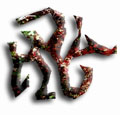
A glyphabet of plant-breath inspired by poet Armand Schwerner

Digital photos by Dan Hatton
Online catalogue of publications & cassettes






in the Lawton
"Babel, Wisconsin:
Xexoxial Printed Matter"
Lawton Gallery,
February 22 - March 23, 2001
University of Wisconsin-Green Bay
This exhibition presents two of the many intermedial artforms that Miekal And
and Lyx Ish (formerly Elizabeth Was) have explored since they began collaborating
in 1981. Based in Madison throughout the 1980's these two "polyartists"
have continuously endeavored to expand and collapse different art and non-art
forms within their myriad activities. These activities include street performances,
improvised music (noise) concerts, outdoor exhibitions and installations, creating
homemade instruments, computer art and collaborating with like-minded artists
in the production of artists' books, periodicals and music cassettes.
Xexoxial (ze-zok-zial) Editions was established in 1981 to publish work by experimental
writers and artists who were unable to find publishers for their unconventional
creations.(1) Utilizing the economy and speed of the photocopy machine they
have since published over 180 books and periodicals showcasing their own works
as well those of writers, poets, and visual artists from the Americas and Europe.
A unique aspect of their use of the photocopy machine has been their strategy
of "on-demand" printing, in which copies are printed in response to
requests from customers. This method of publishing sidesteps the costs and storage
problems inherent in traditional publishing as well as minimizing the labor
expended in creating these one-of-a-kind handmade publications.
Improvisation and collaboration are the hallmarks of their working methods and
many of the books presented here are the product of a collaboration between
artists and writers. Miekal and Lyx as editors/designers, have exercised enough
creativity to be considered collaborators with those whose works they published.
Good examples of this would be Crag Hill's Dict for which Lyx collaged both
the cover and the dictionary illustrations, and Gris Gris Malkuth (Berry/Eberly)
for which Miekal created a font called Glitch. One periodical, The Acts the
Shelflife, is a unique collaborative periodical in which contributors submit
a specific number of finished pages, which are then bound together to create
the final edition of the periodical.
An overriding theme in many of their publications is an engagement with language
as a plastic element to be manipulated, rearranged, and recodified in order
to stretch its conventional meanings. This exploration seeks to bring a new
visuality and expressive charge to conventional orthography. In a similar manner,
visual images are used as raw material for creating new constellations of meaning
through a process of collage and juxtaposition. Xexoxial Editions delights in
this purposeful remixing of print and visual culture and the unexpected and
improvised works that result from this process.
Accompanying the printed matter section of the exhibition, And, Ish and Liaizon
Wakest (their thirteen year-old son) have created a site-specific photocopy
installation, which comprises the "Babel" component of this show.
An early communique from the artists outlined their intentions for this installation:
"Various calculations suggest that 3 xerox shelters will mark the territory
where all language is reassembled into a visual polyphony of text, symbol &
markings. A place where the black & white universe of the data stream is
on the tip of your tongue, & language returns to its beginnings."
Babel, Wisconsin: Printed Matter from Xexoxial Editions is a spectacular
cacophony of two and three dimensional visual and textual experimentations that
challenge normative ideas about the stability, function and role of language,
as well as its relationship to visual images.
Stephen
Perkins
Curator, Lawton Gallery
(1) Originally Xexoxial Editions was called Xerox Sutra Editions. In 1986 the name was changed when the organization became a non-profit In order to avoid copyright problems with the word xerox, "xexoxial" was invented to suggest "the age of infinite reproduction."


